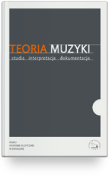From Authenticity to Stylization: Processing Modality in the Late Works of Ludwig van Beethoven
From Authenticity to Stylization: Processing Modality in the Late Works of Ludwig van Beethoven
Author(s): Małgorzata GrajterSubject(s): Music, Sociology of Art, History of Art
Published by: Akademia Muzyczna w Krakowie im. Krzysztofa Pendereckiego
Keywords: Beethoven; modality; sacral music; folksongs; musical aesthetics;
Summary/Abstract: Parallel to the main trend of his compositional work, in spaceyears 1809-1820, Beethoven composed a total of 179 folk songs for voices and piano trio. Especially in the years 1815-1818, apparently in the face of a creative crisis, Beethoven devoted a lot of time to this relatively insignificant activity. As Nicole Biamonte proves, a significant part of the melodies created by the composer are based on modal scales.Interestingly, the following words can be found in Beethoven's diary (Tagebuch) from the same period: "To write real church music, look through all the Gregorian chants, etc." . In later years, the creator incorporated elements of modal scales into his original works, mainly of a religious or spiritual nature, including the Credo from the Missa solemnis, Op. 123 and the middle part of the String Quartet in A minor, Op. 132 (Heiliger Dankgesang eines Genesenen an die Gottheit in der lydischen Tonart).Although these examples of the use of modality in Beethoven's works are widely known and described in the academic literature, little research takes into account the complexity of the composer's approach to modality. The main idea of this article is to present in more detail the historical and aesthetic context that could have influenced the development of Beethoven's attitude towards modality, as well as to indicate the relationship between the experience of adapting original folk music based on modal scales and the use of elements of modality in his own work. These experiences, although different in nature, seem closely related to each other: both show the technical and expressive tension between tonality as the default, universal system and modality as a substitute for "foreign" music; in this case archaic or ethnic.
Journal: Teoria Muzyki. Studia, Interpretacje, Dokumentacje
- Issue Year: IX/2020
- Issue No: 17
- Page Range: 84-104
- Page Count: 21
- Language: English

